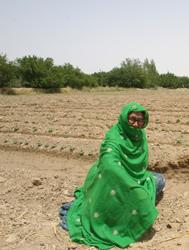You are here » Home » Telling Our Story
First Person
Baloch women learn to grow and preserve their own produce
A Kitchen Garden for the First Time

| |
Photo: USAID/Kaukab Jhumra Smith
|
|
Bakhtawar, a grandmother from Loralai District, Balochistan, Pakistan, is proud of her first-ever vegetable seedlings.
“I started a vegetable garden because, for the first time, now I know how,” said Bakhtawar, a woman from rural Balochistan, Pakistan.
|
Bakhtawar, a grandmother who lives with her extended family in Murtad Kilan village in Pakistan’s Balochistan province, recently planted her very first vegetable garden next to her home. She planted tomatoes, eggplants, gourds, and okra — summer vegetables used in daily cooking but usually available only at markets. Thanks to a USAID-funded program run together with the U.N. Food and Agriculture Organization, more than 500 women like Bakhtawar in three districts are learning how to maintain kitchen gardens and preserve and process their yield.
In Loralai District, Bakhtawar and 279 others learned to grow vegetables and preserve food from five local women who attended a two-week master training course at an agricultural university in Faisalabad, Punjab. Communities selected their trainers from among women who were literate and experienced in conducting local health or vocational workshops. It was a breakthrough for women from this socially conservative province to travel from their villages to a different province, said Asima Basit, a community organizer who worked on the project.
Upon returning to Balochistan, the trainers conducted five-day workshops on planting seeds, using fertilizer, controlling plant disease, and improving seasonal home cultivation, as well as a separate week-long workshop on canning and making pastes, pickles, jams, and jellies for the home or for sale at the market. “We used to buy pickles and jams from the bazaar in Quetta, but now we can save money by making them ourselves,” said Rubina Kausar, a resident of Mastung District. These skills also keep excess seasonal produce from going to waste. In addition, at least two women’s groups have established links with retailers in Quetta, the provincial capital, to sell their output.
“I started a vegetable garden because, for the first time now, I know how,” Bakhtawar said. “Now we can do it better than the men.” While men usually cultivate commercial crops, the women in Loralai now grow seasonal produce year-round to diversify their families’ diets, save money, and sell their own food products for added income. Bakhtawar’s family of 30 used to spend about $30 a month on vegetables, but now that she cultivates her own kitchen garden and cans her own vegetables, the family’s living costs are going down.
Print-friendly version of this page (454kb - PDF)
Click here for high-res photo
Back to Top ^ | 

